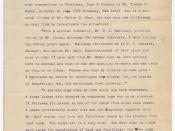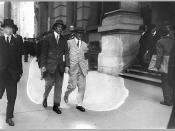Friedrich Engels and Upton Sinclair's works of literature both had one agenda: exposure of workplace and housing conditions and workplace reform. Upton Sinclair's exposure of urban problems was different from that of Engels because Sinclair's writings and effort had an impact on government policy. "Upton Sinclair attacked the meat-packing industry in The Jungle, and Congress responded to the uproar by regulating the industry." (Edmondson, 1993) Sinclair made known the unsanitary conditions in Chicago's meatpacking industry, which prompted the passage of inspection and food and drug laws. Sinclair's views and beliefs along with his characters are illustrated vividly. I found it interesting that after President Roosevelt received a copy of Sinclair's book, he found it hard to believe the details Sinclair described. Not believing the story, Roosevelt sent government investigators to check the validity of the report and when they came back and confirmed the story, Roosevelt threatened Congress and the meatpacking industry that he would release this information publicly.
In the huge city of Chicago, when things fell apart, it felt like a jungle for the people who were not prepared."
Friendrich Engels' writings, stories and illustrations blamed the government for bad planning, or lack of it regarding worker's neighborhoods. He describes dirty and slum living conditions where as up to forty families living in one house sharing a bathroom with many other families. Engels chastised the government for not assisting the working class neighborhoods with essentials. I feel the major difference of Sinclair and Engels is the viewpoint of the two authors. Sinclair blamed the industry and their failure to monitor healthy working conditions, where as Engels blamed the government for their failure to assist those in need.
Upton Sinclair and his "fictional" account using characters, seems to be more credible only because the attention it received from President Roosevelt and Congress and the ultimate impact it had on urban life. The use of characters in Sinclair's work gives a personal account and allows the reader to become involved in what he has to say. While Engels information about problems, unfair working and housing conditions, was extremely important to expose and truthful, his non-fiction style of writing was one that did not capture and keep one interested.
References
Edmondson, Brad. Return of the Jungle. American Demographics; March 1993. Vol. 15 Iss. 3, p 2.
LeGates, Richard T. and Frederic Stout. The City Reader. New York: Routledge, 2005.


